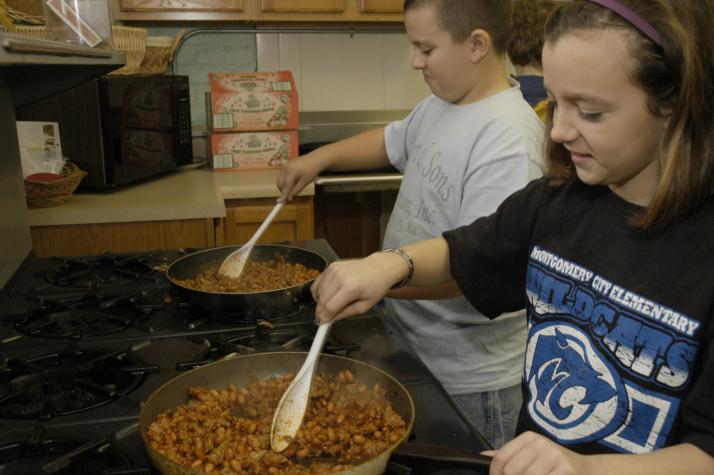MONTGOMERY CITY, Mo. – In a crowded kitchen in a church basement, nine elementary school kids are cooking lunch. You might think it’s a recipe for disaster—kids are using knives, handling raw meat, working at a big gas range, and there’s not much elbow room—but they know their jobs and the turkey tacos and fruit smoothies turn out fine, with no injuries and not too much of a mess in the kitchen.
The students are participants in Cooking Matters for Kids, a six-week course for third- through fifth-grade children that connects learning about health and nutrition to hands-on experience in the kitchen.
Kids may learn some basic kitchen skills in middle school home economics classes, but by fifth or sixth grade, kids already are on average preparing at least one meal per week by themselves, said Chris Merritt, nutrition specialist for University of Missouri Extension. Merritt is teaching the class with assistance from Luella Fischer, MU Extension 4-H youth program associate.
“We need to get information on food and nutrition to elementary school students,” Merritt said. “The kids need to know it now and hear it repeatedly. The more we get the information out to the students, the more likely they are to continue using this information as they get older.”
A room near the kitchen is set up as a simulated grocery store, with cans, boxes and plastic-replica fruits and vegetables arranged as you would find them in a typical supermarket.
“We go over the information on food labels that is important in making healthy food choices,” Merritt said. “We talk about added sugars in food. We also try to stress the importance of being active.”
“I was surprised about how much sugar was in some cereals,” said fifth-grader Abbie Doyle. For Abbie, the importance of healthy eating isn’t just an abstract concept. “I play soccer. If you eat a lot of junk food you won’t run as fast.”
Making good nutritional choices is harder these days. People are cooking less and relying more on fast food and convenience foods, which tend to be high in cost and low in nutritional value. And more people today are coming of age lacking the cooking skills their grandparents took for granted.
“A lot of people don’t know there are ways to prepare vegetables other than boiling them in a pot of water or thawing them in the microwave,” Merritt said.
The kids in his class learn about a variety of techniques, such as chopping, puréeing, baking, sautéing and stir-frying,
The curriculum emphasizes lower-fat recipes and the use of spices to enhance flavor. “We want to talk about nutrition and weight control before fad diets take over their behaviors,” Merritt said.
Or, as Abbie Doyle puts it: “You can eat healthier now to help you get used to it earlier. You can have junk food sometimes but you don’t want it to be a habit where you eat it all the time.”
Merritt encourages parents to involve their children in choosing and preparing meals.
“Take them shopping and let them have some input in what you’re purchasing,” he said. “Let kids help in the preparation so they have an investment in the meal. Let them open cans. Let them use the knives after they’ve had training.
“Make it an adventure.”
Cooking Matters for Kids is part of a national program operated by Share Our Strength, a nonprofit founded in 1984 to fight global hunger. Through courses tailored for low-income adults, families, kids, teens and child-care professionals, Cooking Matters provides nutrition education, hands-on cooking instruction and help with food budgeting skills.
In Missouri, Cooking Matters is administered by Operation Food Search, a food bank that has been running Cooking Matters classes in the St. Louis area since 2000. Operation Food Search has teamed up with MU Extension to expand Cooking Matters throughout the state. Funding is from Operation Food Search and the USDA’s Supplemental Nutrition Assistance Program.
MU Extension will be launching new Cooking Matters for Kids classes in Elsberry, Mo., and adult classes in Miller and Montgomery counties and St. Louis. For more information about Cooking Matters courses in your area, contact your local MU Extension center.
Related links:
